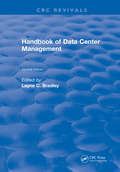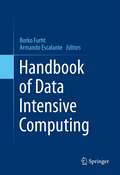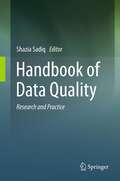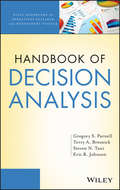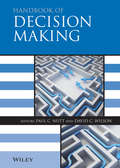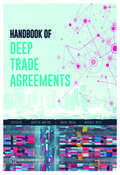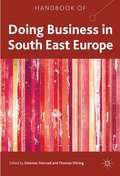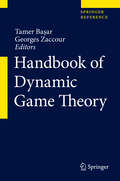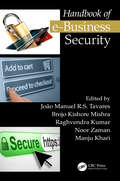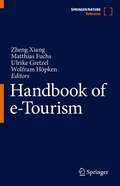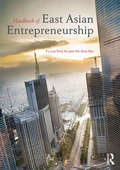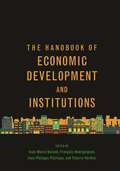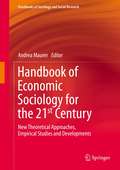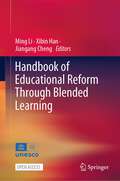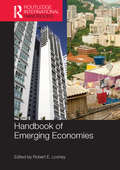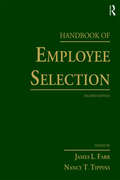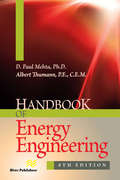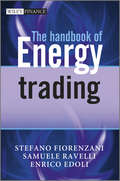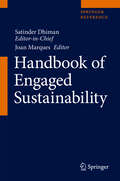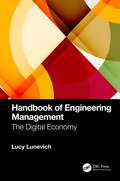- Table View
- List View
Handbook of Data Center Management: Second Edition (CRC Press Revivals)
by Layne C. BradleyAccounting for the rapid and often confusing changes currently underway in the information systems of organizations, such as the rush to replace mainframes with networks and the decentralization of data storage and processing, provides insights on the duties and challenges of a data center manager. Covers strategic planning, management practices, controls, systems and contingency planning, network technology, human resources, desktop computing, and future directions....
Handbook of Data Intensive Computing
by Armando Escalante Borko FurhtData Intensive Computing refers to capturing, managing, analyzing, and understanding data at volumes and rates that push the frontiers of current technologies. The challenge of data intensive computing is to provide the hardware architectures and related software systems and techniques which are capable of transforming ultra-large data into valuable knowledge. Handbook of Data Intensive Computing is written by leading international experts in the field. Experts from academia, research laboratories and private industry address both theory and application. Data intensive computing demands a fundamentally different set of principles than mainstream computing. Data-intensive applications typically are well suited for large-scale parallelism over the data and also require an extremely high degree of fault-tolerance, reliability, and availability. Real-world examples are provided throughout the book. Handbook of Data Intensive Computing is designed as a reference for practitioners and researchers, including programmers, computer and system infrastructure designers, and developers. This book can also be beneficial for business managers, entrepreneurs, and investors.
Handbook of Data Quality: Research and Practice
by Shazia SadiqThe issue of data quality is as old as data itself. However, the proliferation of diverse, large-scale and often publically available data on the Web has increased the risk of poor data quality and misleading data interpretations. On the other hand, data is now exposed at a much more strategic level e.g. through business intelligence systems, increasing manifold the stakes involved for individuals, corporations as well as government agencies. There, the lack of knowledge about data accuracy, currency or completeness can have erroneous and even catastrophic results. With these changes, traditional approaches to data management in general, and data quality control specifically, are challenged. There is an evident need to incorporate data quality considerations into the whole data cycle, encompassing managerial/governance as well as technical aspects. Data quality experts from research and industry agree that a unified framework for data quality management should bring together organizational, architectural and computational approaches. Accordingly, Sadiq structured this handbook in four parts: Part I is on organizational solutions, i.e. the development of data quality objectives for the organization, and the development of strategies to establish roles, processes, policies, and standards required to manage and ensure data quality. Part II, on architectural solutions, covers the technology landscape required to deploy developed data quality management processes, standards and policies. Part III, on computational solutions, presents effective and efficient tools and techniques related to record linkage, lineage and provenance, data uncertainty, and advanced integrity constraints. Finally, Part IV is devoted to case studies of successful data quality initiatives that highlight the various aspects of data quality in action. The individual chapters present both an overview of the respective topic in terms of historical research and/or practice and state of the art, as well as specific techniques, methodologies and frameworks developed by the individual contributors. Researchers and students of computer science, information systems, or business management as well as data professionals and practitioners will benefit most from this handbook by not only focusing on the various sections relevant to their research area or particular practical work, but by also studying chapters that they may initially consider not to be directly relevant to them, as there they will learn about new perspectives and approaches.
The Handbook of Dealing with Workplace Bullying
by Anne-Marie QuiggThe topic of workplace bullying and abuse gained considerable public and media attention during 2013 when the scandal of events at the BBC was unveiled following an enquiry led by Dinah Rose QC. The Handbook of Dealing with Workplace Bullying, edited by Dr Anne-Marie Quigg, presents the collective wisdom and knowledge of a number of lawyers, management experts and academics from around the world. The key themes include understanding the law in each country represented and the responsibilities of individuals as well as management teams and governors in organizations. New case studies are supplied by people working with and within HR teams who have professional experience of dealing with the issue, as well as practical suggestions that are of use to managers, to people accused of bullying and also to people who find they are targets of bullying. Dr Quigg summarizes the range and scope of the contributions by the individual contributors, commenting on the research findings and professional experience that informs them. The book thus reflects the variety of options for dealing with bullying that are relevant in different parts of the world, and focuses on advice that is pertinent in real life, rather than presenting a collection of academic theories.
Handbook of Decision Analysis
by Eric R. Johnson Gregory S. Parnell Terry Bresnick Steven N. TaniA ONE-OF-A-KIND GUIDE TO THE BEST PRACTICES IN DECISION ANALYSISDecision analysis provides powerful tools for addressing complex decisions that involve uncertainty and multiple objectives, yet most training materials on the subject overlook the soft skills that are essential for success in the field. This unique resource fills this gap in the decision analysis literature and features both soft personal/interpersonal skills and the hard technical skills involving mathematics and modeling.Readers will learn how to identify and overcome the numerous challenges of decision making, choose the appropriate decision process, lead and manage teams, and create value for their organization. Performing modeling analysis, assessing risk, and implementing decisions are also addressed throughout. Additional features include:Key insights gleaned from decision analysis applications and behavioral decision analysis researchIntegrated coverage of the techniques of single- and multiple-objective decision analysisMultiple qualitative and quantitative techniques presented for each key decision analysis taskThree substantive real-world case studies illustrating diverse strategies for dealing with the challenges of decision makingExtensive references for mathematical proofs and advanced topicsThe Handbook of Decision Analysis is an essential reference for academics and practitioners in various fields including business, operations research, engineering, and science. The book also serves as a supplement for courses at the upper-undergraduate and graduate levels.
Handbook of Decision Making
by David C. Wilson Paul C. NuttWiley's new Handbook of Decision Making is a vital reference text for all students and professionals of management, organization and decision making. The handbook offers a wide range of theoretical and empirical approaches to the understanding of organizational and strategic decisions. Contributors are internationally known experts drawn from North America, Canada and Europe who have spent many years in the study of decision making, and decision making relevant topics. We believe the handbook will become a tour de force in the understanding decision making, offering a wide variety of perspectives, topics, and summative understanding of the field. Chapters in the Handbook were prepared by the leading experts in their field and include cutting edge empirical, theoretical, and review chapters. The chapters bring together for the first time a critical mass of writing on decision making as an organizational and research activity. The Editors are two of the leading international experts in decision making and contribute to the Handbook with five original Chapters that offer an appraisal of the field and suggestions for research, as well as the current status of decision making practice and suggestion for improvement.
Handbook of Deep Trade Agreements
by Aaditya Mattoo, Nadia Rocha, and Michele RutaDeep trade agreements (DTAs) cover not just trade but additional policy areas, such as international flows of investment and labor and the protection of intellectual property rights and the environment. Their goal is integration beyond trade or deep integration. These agreements matter for economic development. Their rules influence how countries (and hence, the people and firms that live and operate within them) transact, invest, work, and ultimately, develop. Trade and investment regimes determine the extent of economic integration, competition rules affect economic efficiency, intellectual property rights matter for innovation, and environmental and labor rules contribute to environmental and social outcomes. This Handbook provides the tools and data needed to analyze these new dimensions of integration and to assess the content and consequences of DTAs. The Handbook and the accompanying database are the result of collaboration between experts in different policy areas from academia and other international organizations, including the International Trade Centre (ITC), Organisation for Economic Co-operation and Development (OECD), United Nations Conference on Trade and Development (UNCTAD), and World Trade Organization (WTO).
Handbook of Doing Business in South East Europe
by Dietmar Sternad Thomas D�ringA comprehensive insight into a region which is characterized by rapid economic and social changes with a significant rise in foreign direct investments and privatization. Analysis covers political, legal, economic and social trends,and topics such as the influence of informal networks and corruption, as well as cultural diversity.
The Handbook of Drone Photography: A Complete Guide to the New Art of Do-It-Yourself Aerial Photography
by Chase GuttmanDrones are the next frontier in photography. This cutting-edge technology, still unexplored by the masses, can bring visual artistry to new and exciting heights. The Handbook of Drone Photography will be the go-to manual for consumers wishing to harness the power of drones to capture stunning aerial photographs.This book covers everything one needs to choose the right drone, to get airborne, and to capture and share incredible content. With easy and straightforward instruction, the text will familiarize readers with their craft and its controls. Readers will master drones’ extraordinary image-capturing capabilities and review detailed photography tips that can bring their artistic vision to life. For the first time, aerial photography is open to everyone, and award-winning travel photographer Chase Guttman will guide readers’ drone ventures from beginning to end. The Handbook of Drone Photography can help anyone break into this thrilling, high-potential space and launch their own lofty explorations today.
Handbook of Dynamic Game Theory
by Georges Zaccour Tamer BaşarThis will be a two-part handbook on Dynamic Game Theory and part of the Springer Reference program. Part I will be on the fundamentals and theory of dynamic games. It will serve as a quick reference and a source of detailed exposure to topics in dynamic games for a broad community of researchers, educators, practitioners, and students. Each topic will be covered in 2-3 chapters with one introducing basic theory and the other one or two covering recent advances and/or special topics. Part II will be on applications in fields such as economics, management science, engineering, biology, and the social sciences.
Handbook of e-Business Security
by João Manuel Tavares Brojo Kishore Mishra Raghvendra Kumar Noor Zaman Manju KhariThere are a lot of e-business security concerns. Knowing about e-business security issues will likely help overcome them. Keep in mind, companies that have control over their e-business are likely to prosper most. In other words, setting up and maintaining a secure e-business is essential and important to business growth. This book covers state-of-the art practices in e-business security, including privacy, trust, security of transactions, big data, cloud computing, social network, and distributed systems.
Handbook of e-Tourism
by Zheng Xiang Matthias Fuchs Ulrike Gretzel Wolfram HöpkenThis handbook provides an authoritative and truly comprehensive overview both of the diverse applications of information and communication technologies (ICTs) within the travel and tourism industry and of e-tourism as a field of scientific inquiry that has grown and matured beyond recognition. Leading experts from around the world describe cutting-edge ideas and developments, present key concepts and theories, and discuss the full range of research methods. The coverage accordingly encompasses everything from big data and analytics to psychology, user behavior, online marketing, supply chain and operations management, smart business networks, policy and regulatory issues – and much, much more. The goal is to provide an outstanding reference that summarizes and synthesizes current knowledge and establishes the theoretical and methodological foundations for further study of the role of ICTs in travel and tourism. The handbook will meet the needs of researchers and students in various disciplines as well as industry professionals. As with all volumes in Springer’s Major Reference Works program, readers will benefit from access to a continually updated online version.
Handbook of East Asian Entrepreneurship
by Fu-Lai Tony Yu and Ho-Don YanWith the shift of the global economic gravity toward emerging economies and the roaring economic growth of the past three decades in China, East Asian catching-up growth strategies have profound implications for latecomer economies. While there are many handbooks on entrepreneurship in general, there is no reference on East Asian entrepreneurship. This is the first of its kinds in the market. The volume provides a useful reference for those who want to know East Asian entrepreneurship and business systems. It also provides many excellent cases and illustrations on the growth of entrepreneurial firms and the rise of branded products in East Asia. Policy makers or scholars who are interested in entrepreneurship, small and medium sized enterprises, Asian business systems, international business, innovation and technology management, economic development, strategic management and East Asian studies would benefit from this volume. The volume contains two parts. The first part is the key concepts associate with entrepreneurship and East Asian firm growth and transformation. The second part presents cases of entrepreneurial firms and their founders in East Asia, including Japan, South Korea, Taiwan, Hong Kong and China. With the handbook, scholars, students and policy makers can grab some basic ideas how entrepreneurs and firms in East Asia compete and survive in the world market and understand why and how East Asia economies can emerge as one of the most dynamic regions in the world. Part I concepts: relating to Entrepreneurship: Guanxi Catching-up strategies Types of entrepreneurship Business System Strategic Management Leadership Part II cases cover variedly from manufacturing to services industries, and specifically including traditional and newly corporations ranging from toys, convenient stores, fast fashion, high-tech, to catering and service. Written by experts in their respective areas, Handbook of East Asia entrepreneurship is an excellent review of theories, policies and empirical evidences on important topics in Entrepreneurship in East Asian economic development. The book is both a superb teaching tool and a valuable handbook in development economics.
The Handbook of Economic Development and Institutions
by Jean-Marie Baland François Bourguignon Jean-Philippe Platteau Thierry VerdierThe definitive reference on the most current economics of development and institutionsThe essential role that institutions play in understanding economic development has long been recognized across the social sciences, including in economics. Academic and policy interest in this subject has never been higher. The Handbook of Economic Development and Institutions is the first to bring together in one single volume the most cutting-edge work in this area by the best-known international economists. The volume’s editors, themselves leading scholars in the discipline, provide a comprehensive introduction, and the stellar contributors offer up-to-date analysis into institutional change and its interactions with the dynamics of economic development.This book focuses on three critical issues: the definitions of institutions in order to argue for a causal link to development, the complex interplay between formal and informal institutions, and the evolution and coevolution of institutions and their interactions with the political economy of development. Topics examined include the relationship between institutions and growth, educational systems, the role of the media, and the intersection between traditional systems of patronage and political institutions. Each chapter—covering the frontier research in its area and pointing to new areas of research—is the product of extensive workshopping on the part of the contributors.The definitive reference work on this topic, The Handbook of Economic Development and Institutions will be essential for academics, researchers, and professionals working in the field.
The Handbook of Economic Sociology: Second Edition
by Neil J. Smelser and Richard SwedbergThe Handbook of Economic Sociology, Second Edition is the most comprehensive and up-to-date treatment of economic sociology available. The first edition, copublished in 1994 by Princeton University Press and the Russell Sage Foundation as a synthesis of the burgeoning field of economic sociology, soon established itself as the definitive presentation of the field, and has been widely read, reviewed, and adopted. Since then, the field of economic sociology has continued to grow by leaps and bounds and to move into new theoretical and empirical territory. The second edition, while being as all-embracing in its coverage as the first edition, represents a wholesale revamping. Neil Smelser and Richard Swedberg have kept the main overall framework intact, but nearly two-thirds of the chapters are new or have new authors. As in the first edition, they bring together leading sociologists as well as representatives of other social sciences. But the thirty chapters of this volume incorporate many substantial thematic changes and new lines of research--for example, more focus on international and global concerns, chapters on institutional analysis, the transition from socialist economies, organization and networks, and the economic sociology of the ancient world. The Handbook of Economic Sociology, Second Edition is the definitive resource on what continues to be one of the leading edges of sociology and one of its most important interdisciplinary adventures. It is a must read for all faculty, graduate students, and undergraduates doing work in the field. A thoroughly revised and updated version of the most comprehensive treatment of economic sociology available Almost two-thirds of the chapters are new or have new authors Authors include leading sociologists as well as representatives of other social sciences Substantial thematic changes and new lines of research, including more focus on international and global concerns, institutional analysis, the transition from socialist economies, and organization and networks The definitive resource on what continues to be one of the leading edges of sociology and one of its most important interdisciplinary adventures A must read for faculty, graduate students, and undergraduates doing work in the field
Handbook of Economic Sociology for the 21st Century: New Theoretical Approaches, Empirical Studies and Developments (Handbooks of Sociology and Social Research)
by Andrea MaurerThis handbook provides an overview on major developments that occurred in the field of economic sociology after its rebirth since the 1980s in the US. It offers new insights on the uniqueness of European economic sociology compared to US economic sociology which emerged at the end of the 20th century. The handbook presents economic sociology as a developing field which started with certain foundations as new economic sociology, widening the perspective by introducing social factors thereby focusing more on general belief systems, social forms of coordination and the relationships between society and the economy. It offers an outstanding portrait of the research field helping to identify major foundations and trajectories as well as new research perspectives for a globalized economic sociology. This makes the handbook appeal to specialized researchers of the field, researchers from other disciplines interested in economic phenomena, as well as graduate and postgraduate students.
Handbook of Educational Reform Through Blended Learning
by Ming Li Xibin Han Jiangang ChengThis open access book provides related theories, methods, strategies, and practical cases for implementing education reform through blended learning in curriculum, program, and institutions in the digital age. It sums up the research and practice achievements of blended learning from different research teams, involving more than 20 experts from educational technology, higher education, vocational education, and education management over the past 20 years.This book recommends relevant policies of blended learning to international organizations and governments in various countries, provides systematic solutions for administrators in institutions to promote educational reform via blended learning, and serves as a reference book for instructors, researchers, and relevant enterprise practitioners.
Handbook of Emerging Economies (Routledge International Handbooks Ser.)
by Robert E. LooneyA major new volume in the Routledge International Handbooks series analysing emerging and newly emerged economies, including the BRICS countries (Brazil, Russia, India, China and South Africa) and other likely (Turkey, Indonesia, Mexico, and South Korea) as well as possible (Vietnam, The Philippines, Nigeria, Pakistan, Egypt, Colombia and Argentina) candidates for emerging economy status. Chapters on theories surrounding emerging markets (including the Beijing/Washington Consensus debate) offer an overview of current issues in development economics, in addition to providing an integrated framework for the country case studies. Written by experts, this handbook will be invaluable to academics and students of economics and emerging economies, as well as to business people and researchers seeking information on economic development and the accelerating pace of globalization.
Handbook of Employee Selection
by James L. Farr Nancy T. TippinsThis second edition of the Handbook of Employee Selection has been revised and updated throughout to reflect current thinking on the state of science and practice in employee selection. In this volume, a diverse group of recognized scholars inside and outside the United States balance theory, research, and practice, often taking a global perspective. Divided into eight parts, chapters cover issues associated with measurement, such as validity and reliability, as well as practical concerns around the development of appropriate selection procedures and implementation of selection programs. Several chapters discuss the measurement of various constructs commonly used as predictors, and other chapters confront criterion measures that are used in test validation. Additional sections include chapters that focus on ethical and legal concerns and testing for certain types of jobs (e.g., blue collar jobs). The second edition features a new section on technology and employee selection. The Handbook of Employee Selection, Second Edition provides an indispensable reference for scholars, researchers, graduate students, and professionals in industrial and organizational psychology, human resource management, and related fields.
Handbook of Energy Engineering (Energy Engineering and Systems)
by D. Paul Mehta Albert ThumannWith new chapters on electrical system optimization and ISO 50001, this edition also covers the latest updates to codes and standards in the energy industry. Also included are chapters on energy economic analysis, energy auditing, waste heat recovery, utility system optimization, HVAC, cogeneration, control systems, energy management, compressed air system optimization and financing energy projects. Additional topics include emerging technologies such as oxy-fuel combustion, high efficiency burners, enhanced heat exchangers, and ceramic membranes for heat recovery as well as information on how to do an energy analysis of any system; electrical system optimization; state-of-the-art lighting and lighting controls. This reference will guide you step by step in applying the principles of energy engineering and management to the design of electrical, HVAC, utility, process and building systems for both new design and retrofit projects. The text is thoroughly illustrated with tables, graphs, diagrams and sample problems.
Handbook of Energy Governance in Europe
by Michèle Knodt Jörg KemmerzellThis Handbook provides the most comprehensive account of energy governance in Europe, examining both energy governance at the European level and the development of energy policy in 30 European countries. Authored by leading scholars, the first part of the book offers a broad overview of the topics of energy research, including theories of energy transitions, strategies and norms of energy policy, governance instruments in the field, and challenges of energy governance. In the second part, it examines the internal and external dimensions of energy governance in the European Union. The third part presents in-depth country studies, which investigate national trajectories of energy policy, including an analysis of the policy instruments and coordination mechanisms for energy transitions. It closes with a comparative analysis of national energy governance. This book is a definitive resource for scholars in energy and climate research as well as decision makers in national governments and EU institutions.
The Handbook of Energy Policy
by Farhad Taghizadeh-Hesary Dayong ZhangThe Handbook of Energy Policy is a unique and novel reference for addressing the policy implications of energy demand and supply from their economic, political, social, planning, and environmental aspects. The Handbook of Energy Policy provides several studies from the global, regional, national, or local perspectives that are of wider policy significance. Studies provided in this book are of interest to the international organizations, governments, public and private sector entities, local communities, universities, research institutions, and other non-governmental organizations. Topics covered in the Handbook of Energy Policy are including energy security, energy poverty, energy finance, energy pricing, energy and environment, energy and sustainability, energy and growth, energy efficiency, energy trade, technological innovation and energy, energy transition, energy nexus studies, economics, and policy of fossil fuels, economics, and policy of renewable and green energies. The policy recommendations provided in all chapters are supported by a rigorous empirical or theoretical analysis.
The Handbook of Energy Trading
by Stefano Fiorenzani Samuele Ravelli Enrico EdoliTo thrive in today's booming energy trading market you need cutting-edge knowledge of the latest energy trading strategies, backed up by rigorous testing and practical applicationUnique in its practical approach, The Handbook of Energy Trading is your definitive guide. It provides a valuable insight into the latest strategies for trading energy--all tried and tested in maintaining a competitive advantage--illustrated with up-to-the-minute case studies from the energy sector.The handbook takes you through the key aspects of energy trading, from operational strategies and mathematical methods to practical techniques, with advice on structuring your energy trading business to optimise success in the energy market.A unique integrated market approach by authors who combine academic theory with vast professional and practical experienceGuidance on the types of energy trading strategies and instruments and how they should be usedSoaring prices and increasingly complex global markets have created an explosion in the need for robust technical knowledge in the field of energy trading, derivatives, and risk management. The Handbook of Energy Trading is essential reading for all energy trading professionals, energy traders, and risk managers, and in fact anyone who has ever asked: 'what is energy trading?'
Handbook of Engaged Sustainability
by Satinder Dhiman Joan MarquesThis handbook is based on the premise that in order for sustainability to be sustainable, a profound psychological transformation has to take place at the individual and collective level. Focusing on the practice of environmental sustainability, this handbook will explore the application of sustainability in a wide variety of contemporary contexts—from economics of consumption and growth to government policy, sustainable cities, and sustainable planet. The editors believe that the way to achieve sustainable, harmonious living in all spheres is through lived or engaged sustainability at the personal, team, and organizational levels. It is impossible to separate economic development issues from environment issues. In its most practical aspect, sustainability is about understanding the interconnections among environment, society, and economy. This book aims to provide a comprehensive overview of current theories and approaches in the area of engaged sustainability for academics, researchers and practitioners. Specifically, it will focus on making responsible decisions that will reduce humanity’s negative impact on the environment. While various social and political initiatives for sustainability are welcome, one cannot really enact sustainability into legislative laws. Something has to change fundamentally at the level of a common person in the street. The Handbook of Engaged Sustainability acknowledges the classic literature, theories and principles in the area of sustainability, but also provides new theories and approaches from global scholars and practitioners in the field. It will also provide a well-structured pedagogical framework with real life case examples. The aim of this handbook is to expand the reader’s thinking to one of “big-picture awareness” and a “cosmic vision” of sustainability, a vision that extends from our neighborhoods to our communities, to states, countries, globe, galaxy, and envelops the entire Universe! This book will serve as an essential resource for researchers, scholars and students of sustainability, ethics, corporate social responsibility and environmental economics, as well as consultants, business and team leaders, and anyone interested in engaged sustainability.
Handbook of Engineering Management: The Digital Economy
by Lucy LunevichThe Engineering Management discipline remains complex and multidisciplinary, and has progressed and broadened in scope significantly over the last 10–20 years. Previously, the discipline has been fragmented and not aligned with the purposes of economic development, mega-project delivery, and technological progress. Digital engineering has revolutionized the field of engineering by introducing digital tools and technologies to the design, creation, operation, and maintenance of physical systems, products, and services. It has enabled more efficient, effective, and sustainable solutions, and has the potential to drive significant innovation and improve the way we design, build, and operate physical systems. This handbook addresses new content of complexity by offering new engineering concepts such as simple, complicated, and complex, which have never been included in this discipline before and will generate interest from higher education, financial institutions, and technology companies. Handbook of Engineering Management: The Digital Economy focuses on multidisciplinary integration and complex evolving systems. It discusses the incorporation of a system of systems along with engineering economic strategies for sustainable economic growth. This handbook highlights functional leadership as the main part of an engineering manager’s competency and discusses how to form alliances strategically. In addition, it presents a comprehensive guide for the implementation of an environmental management system and shows how environmental and social impacts can be assessed in an organization applying digital tools. This handbook also brings together the three important areas of Engineering Management: Knowledge Management, the Digital Economy, and Digital Manufacturing. In addition, this handbook provides a comprehensive guide to implementing an environmental management system and shows how environmental and social impacts in an organization can be assessed using digital tools. Based on the authors’ practical experience, it describes various management approaches and explains how such a system can be used to prioritize actions and resources, increase efficiency, minimize costs, and lead to better, more informed decision making. It is essential to follow a systematic approach and to ask the right questions, whether the system is managed and implemented by humans, AI, or a combination of both. This handbook is laid out in a series of simple steps and dispels the jargon and myths surrounding this important management tool. This handbook is an ideal read for engineering managers, project managers, industrial and systems engineers, supply chain engineers, professionals who want to advance their knowledge, and graduate students.
